-
The intersection between class and gender and its impact on the quality of employment in Chile
- Source: CEPAL Review, Volume 2016, Issue 120, Dec 2016, p. 131 - 151
- Spanish
-
- 01 May 2017
Abstract
This study explores the impact of the intersection between class and gender on the quality of employment in Chile. The method used to measure social class position is based on the work of Erik O. Wright, while, for the quality of employment, a multidimensional measurement was used, including one index for objective working conditions and two indices for subjective ones (motivation on the job and the perception of control over work processes). The results demonstrate that class and gender give rise to significant differences in objective and subjective job quality. However, the data also indicate that gender (more specifically, the fact of being female) does not necessarily amplify the class-based inequalities observed in the labour market. Drawing on these findings, a number of thoughts about how the class/gender intersection operates in the Chilean labour market are shared in the final section of this study.





